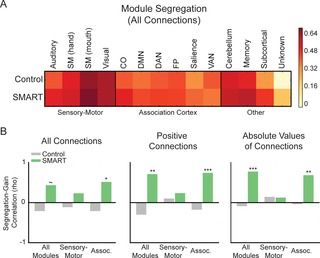Cognitive training interventions are a promising approach to mitigate cognitive deficits common in aging and, ultimately, to improve functioning in older adults. Baseline neural factors, such as properties of brain networks, may predict training outcomes and can be used to improve the effectiveness of interventions. Here, we investigated the relationship between baseline brain network modularity, a measure of the segregation of brain sub-networks, and training-related gains in cognition in older adults. We found that older adults with more segregated brain sub-networks (i.e., more modular networks) at baseline exhibited greater training improvements in the ability to synthesize complex information. Further, the relationship between modularity and training-related gains was more pronounced in sub-networks mediating “associative” functions compared with those involved in sensory-motor processing. These results suggest that assessments of brain networks can be used as a biomarker to guide the implementation of cognitive interventions and improve outcomes across individuals. More broadly, these findings also suggest that properties of brain networks may capture individual differences in learning and neuroplasticity.
Trail Registration: ClinicalTrials.gov, NCT#00977418
Citation: Gallen CL, Baniqued PL, Chapman SB, Aslan S, Keebler M, Didehbani N, et al. (2016) Modular Brain Network Organization Predicts Response to Cognitive Training in Older Adults. PLoS ONE 11(12): e0169015. doi:10.1371/journal.pone.0169015
